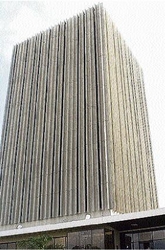
The Bank of Jamaica was forced to increase interest rates last year as part of monetary policies to help to stabilise the economy. - File
In our column published in The Sunday Gleaner yesterday, we judged that the Golding administration failed to meet most of the targets it set for itself in its 2007 election manifesto. But we also noted that events rapidly overtook the country, making any manifesto outdated. In light of the shock to the Jamaican economy from events over which the country has no control, the Golding government had to throw out its blueprint and manage through the crisis. How did it do?
Jamaica was hit hard by a double-whammy of exogenous shocks, starting with the peak of the global financial bubble, followed by the worst global financial crisis since World War II. First, commodity - and particularly oil - prices rose from late 2007, and into 2008. In fact, Jamaicans experienced spiralling increases in the prices for crude oil and rice which rose by 38.9 per cent and 138.6 per cent, respectively, between December 2007 and the end of July 2008. As a result of these price movements, annual inflation increased to 26.5 per cent by July 2008, creating some degree of instability in the market for foreign exchange, according to the Bank of Jamaica.
Fiscal measures
In response to the inflation shock on January 8, 2008, the Govern-ment announced a number of fiscal measures which principally involved the subsidising of food items, such as counter and baking flour, bulk rice, cooking oil and milk powder, up to the end of March that year.
The agriculture minister then called for Jamaicans to consider substituting imported rice with cassava - a seemingly quixotic move which incurred some ridicule, but nonetheless didn't preclude a successful expansion in the manufacturing of cassava chips. And in fairness to the minister, the Planning Institute of Jamaica recently reported that the Government's efforts to boost agricultural productivity have led to a rebound in farm production.
A reduction in the prices of the same commodities that had shot up the year before gave Jamaica a breather. But the price to be paid may have been even worse than the alternative. When the global crisis rocked the world's financial markets in 2008, prices on all assets collapsed. This brought down prices, but also prompted a global recession with deleterious effects on Jamaica. Like other countries, Jamaica had to put whatever economic strategies it had on hold, and turn its attention to crisis management. How did the Golding government fare?
Downturns in the US housing market and financial systems of our major trading partners across the world disrupted the performance of some sectors of the economy - namely tourism and mining - and restricted capital inflows from some of our main private international creditors. The fallout has adversely affected the market for foreign exchange and has to date contributed to an even wider gap in the fiscal accounts and balance-of-payments accounts.
To counteract these challenges, beginning in the latter part of 2008, the Bank of Jamaica implemented a number of monetary policy initiatives in an attempt to alleviate the adverse effects of the crisis. It employed a series of policies that angered the local business community, in particular increasing the interest rates in October and December 2008. Yet CaPRI's research showed that despite their outrage, most businesses were able to cope with the high interest-rate regime over the short term.
Positive results
Meanwhile, the Bank of Jamaica claims that its policy measures during these challenging times generated positive results, as evidenced by the slower pace of depreciation in the exchange rate, a fall in the inflation rate and slight improvements in the Net International Reserves by the end of the first quarter of 2009. The beginning of declines in interest rates, should it become the "new normal", will undoubtedly be welcomed by the business community. However, while the BOJ's efforts deserve recognition, the slight improvements in these economic indicators as a result of its intervention should be attributed to the bank and not necessarily central government since it is the Government that works within the context of the monetary regime and not the other way around.
Under intense pressure from the business lobby, the Government also announced a "stimulus" programme at the end of 2008 (with most policies being implemented in 2009). CaPRI's research found that these policies did little more than improve profit margins in the business sector, and did not in fact do much to save jobs - their stated purpose. Furthermore, CaPRI's research also shows that while individual businesses inevitably go to the wall in a recession, the business community as a whole was resilient.
Restrict its manoeuvres
Perhaps the best thing to be said of the Government's "stimulus" programme and past efforts to subsidise some food items is that the Government had the sense to limit the scope of these initiatives, thereby precluding a heavy impact on the fiscal accounts. However, since it is the most vulnerable in society that need protection, the Government should restrict its limited manoeuvres in that respect to needed social protections. Beyond that, maintaining a stable macroeconomic environment is vital, and fiscal prudence is thus necessary. To this end, the Government's wage freeze and tax packages are likely to positively impact its balance sheet. However, these moves alone are inadequate since the fiscal accounts are currently unsustainable.
All in all, were the policy responses to the crisis the best that could be done in the circumstances? Did the Golding government fare any better or worse than others in managing the crisis? It is to this matter that we will turn our attention in the next article in the series.